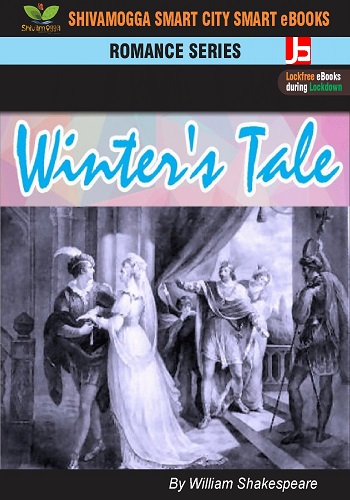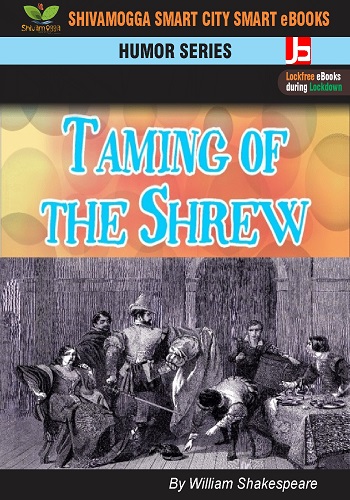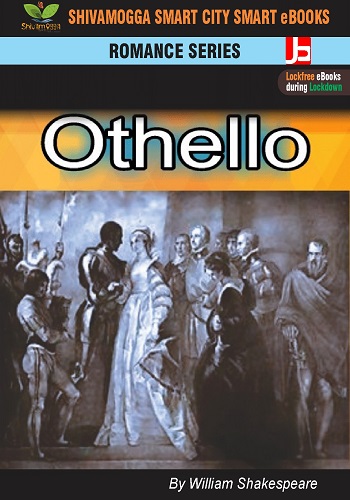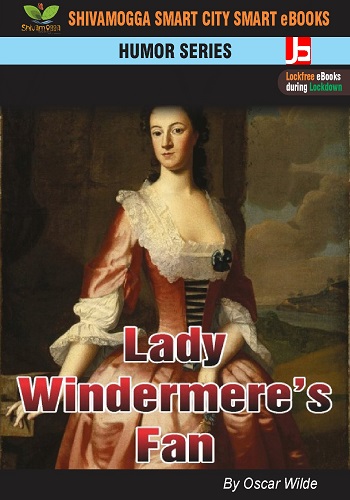Lady Windermere's Fan, A Play About a Good Woman is a four-act comedy by Oscar Wilde, at the St James's Theatre in London. The story concerns Lady Windermere, who suspects that her husband is having an affair with another woman. She confronts him with it but although he denies it, he invites the other woman, Mrs Erlynne, to his wife's birthday ball. Angered by her husband's supposed unfaithfulness, Lady Windermere decides to leave her husband for another lover. After discovering what has transpired, Mrs Erlynne follows Lady Windermere and attempts to persuade her to return to her husband and in the course of this, Mrs Erlynne is discovered in a compromising position. It is then revealed Mrs Erlynne is Lady Windermere's mother, who abandoned her family twenty years before the time the play is set. Mrs Erlynne sacrifices herself and her reputation to save her daughter's marriage. Act I
The play opens in the morning room of the Windermeres' residence in London. It is tea time and Lady Windermere--who is preparing for her coming of age birthday ball that evening--has a visit from a friend, Lord Darlington. She shows off her new fan: a present from her husband. She explains to Lord Darlington that she is upset over the compliments he continues to pay to her, revealing that she is a Puritan and has very particular views about what is acceptable in society. The Duchess of Berwick calls and Lord Darlington leaves shortly thereafter. The Duchess informs Lady Windermere that her husband may be betraying her marriage by making repeated visits to another woman, a Mrs Erlynne, and possibly giving her large sums of money. These rumours have been gossip among London society for quite a while, though seemingly this is the first Lady Windermere has heard about it. Following the departure of the Duchess, Lady Windermere decides to check her husband's bank book. She finds the book in a desk and sees that nothing appears amiss, though on returning she discovers a second bank book: one with a lock. After prying the lock open, she finds it lists large sums of money given to Mrs Erlynne. At this point, Lord Windermere enters and she confronts him. Though he cannot deny that he has had dealings with Mrs Erlynne, he states that he is not betraying Lady Windermere. He requests that she send Mrs Erlynne an invitation to her birthday ball that evening to help her back into society. When Lady Windermere refuses, he writes out an invitation himself. Lady Windermere makes clear her intention to cause a scene if Mrs Erlynne appears, to which Lord Windermere responds that it would be in her best interest not to do so. Lady Windermere leaves in disgust to prepare for the party, and Lord Windermere reveals in soliloquy that he is protecting Mrs Erlynne's true identity to save his wife extreme humiliation. What shall I do? I dare not tell her who this woman really is. The shame would kill her. -- Lord Windermere
 The Winter's Tale is a play by William Shakespeare originally published in the First Folio of 1623. Although it was grouped among the comedies, many modern editors have relabelled the play as one of Shakespeare's late romances. Some critics consider it to be one of Shakespeare's "problem plays" because the first three acts are filled with intense psychological drama, while the last two acts are comedic and supply a happy ending.
The Winter's Tale is a play by William Shakespeare originally published in the First Folio of 1623. Although it was grouped among the comedies, many modern editors have relabelled the play as one of Shakespeare's late romances. Some critics consider it to be one of Shakespeare's "problem plays" because the first three acts are filled with intense psychological drama, while the last two acts are comedic and supply a happy ending. While the word “gentlemen” suggests that its heroes are adults, The Two Gentlemen of Verona is more intelligible if we think of them as boys, leaving home for the first time. One has a crush on a girl, Julia, though he hasn’t yet told her. Sent to court to learn to be “perfect gentlemen,” Valentine and Proteus are derailed by their attraction to Sylvia, the ruler’s daughter. Valentine’s mental denseness does not deter Sylvia from returning his love, but he is caught, and banished, when he tries to elope with her. Proteus’s desire for Sylvia wipes out his former love, leading him into despicable acts that win scorn from Sylvia and wound Julia, who has pursued him disguised as a boy. When Sylvia follows Valentine into banishment, Proteus follows Sylvia, and Julia follows Proteus, the stage is set for a disturbing ending. But the stage is also set for the “gentlemen” to take small steps toward maturity.
While the word “gentlemen” suggests that its heroes are adults, The Two Gentlemen of Verona is more intelligible if we think of them as boys, leaving home for the first time. One has a crush on a girl, Julia, though he hasn’t yet told her. Sent to court to learn to be “perfect gentlemen,” Valentine and Proteus are derailed by their attraction to Sylvia, the ruler’s daughter. Valentine’s mental denseness does not deter Sylvia from returning his love, but he is caught, and banished, when he tries to elope with her. Proteus’s desire for Sylvia wipes out his former love, leading him into despicable acts that win scorn from Sylvia and wound Julia, who has pursued him disguised as a boy. When Sylvia follows Valentine into banishment, Proteus follows Sylvia, and Julia follows Proteus, the stage is set for a disturbing ending. But the stage is also set for the “gentlemen” to take small steps toward maturity. Love and wit conquer all in Shakespeare's sparkling comedy of self-delusion and disguise. Padua holds many suitors for the hand of fair Bianca, but Bianca may not be married until her spinster sister, Kate, is wed. Could any man be rash enough to take on Kate? The witty adventurer Petruchio undertakes the task. While he sets about transforming Kate from foul-tempered termagant to loving wife, young Lucentio and his clever servant
Love and wit conquer all in Shakespeare's sparkling comedy of self-delusion and disguise. Padua holds many suitors for the hand of fair Bianca, but Bianca may not be married until her spinster sister, Kate, is wed. Could any man be rash enough to take on Kate? The witty adventurer Petruchio undertakes the task. While he sets about transforming Kate from foul-tempered termagant to loving wife, young Lucentio and his clever servant Two pairs of young lovers fall asleep in an ancient Athenian forest and wake to find themselves in the middle of a good deed gone wrong. A Midsummer Night's Dream conjures up a fairyland inhabited by well-intentioned sprites whose magic leads to farcical confusion. The mirthful tangle of mistaken identities and misplaced affections develops and resolves in the glorious poetry of England's greatest playwright.Shakespeare's fantastical comedy has enchanted audiences
Two pairs of young lovers fall asleep in an ancient Athenian forest and wake to find themselves in the middle of a good deed gone wrong. A Midsummer Night's Dream conjures up a fairyland inhabited by well-intentioned sprites whose magic leads to farcical confusion. The mirthful tangle of mistaken identities and misplaced affections develops and resolves in the glorious poetry of England's greatest playwright.Shakespeare's fantastical comedy has enchanted audiences Othello (The Romance of Othello, the Moor of Venice) is a tragedy by William Shakespeare. It is based on the story Un Capitano Moro ("A Moorish Captain") by Cinthio (a disciple of Boccaccio's). The story revolves around its two central characters: Othello, a Moorish general in the Venetian army, and his treacherous ensign, Iago. Given its varied and enduring themes of racism, love, jealousy, betrayal, revenge, and repentance.
Othello (The Romance of Othello, the Moor of Venice) is a tragedy by William Shakespeare. It is based on the story Un Capitano Moro ("A Moorish Captain") by Cinthio (a disciple of Boccaccio's). The story revolves around its two central characters: Othello, a Moorish general in the Venetian army, and his treacherous ensign, Iago. Given its varied and enduring themes of racism, love, jealousy, betrayal, revenge, and repentance. Lady Windermere's Fan, A Play About a Good Woman is a four-act comedy by Oscar Wilde, at the St James's Theatre in London. The story concerns Lady Windermere, who suspects that her husband is having an affair with another woman. She confronts him with it but although he denies it, he invites the other woman, Mrs Erlynne, to his wife's birthday ball. Angered by her husband's supposed unfaithfulness, Lady Windermere decides to leave her husband for another lover. After discovering what has transpired, Mrs Erlynne follows Lady Windermere and attempts to persuade her to return to her husband and in the course of this, Mrs Erlynne is discovered in a compromising position. It is then revealed Mrs Erlynne is Lady Windermere's mother, who abandoned her family twenty years before the time the play is set. Mrs Erlynne sacrifices herself and her reputation to save her daughter's marriage. Act I The play opens in the morning room of the Windermeres' residence in London. It is tea time and Lady Windermere--who is preparing for her coming of age birthday ball that evening--has a visit from a friend, Lord Darlington. She shows off her new fan: a present from her husband. She explains to Lord Darlington that she is upset over the compliments he continues to pay to her, revealing that she is a Puritan and has very particular views about what is acceptable in society. The Duchess of Berwick calls and Lord Darlington leaves shortly thereafter. The Duchess informs Lady Windermere that her husband may be betraying her marriage by making repeated visits to another woman, a Mrs Erlynne, and possibly giving her large sums of money. These rumours have been gossip among London society for quite a while, though seemingly this is the first Lady Windermere has heard about it. Following the departure of the Duchess, Lady Windermere decides to check her husband's bank book. She finds the book in a desk and sees that nothing appears amiss, though on returning she discovers a second bank book: one with a lock. After prying the lock open, she finds it lists large sums of money given to Mrs Erlynne. At this point, Lord Windermere enters and she confronts him. Though he cannot deny that he has had dealings with Mrs Erlynne, he states that he is not betraying Lady Windermere. He requests that she send Mrs Erlynne an invitation to her birthday ball that evening to help her back into society. When Lady Windermere refuses, he writes out an invitation himself. Lady Windermere makes clear her intention to cause a scene if Mrs Erlynne appears, to which Lord Windermere responds that it would be in her best interest not to do so. Lady Windermere leaves in disgust to prepare for the party, and Lord Windermere reveals in soliloquy that he is protecting Mrs Erlynne's true identity to save his wife extreme humiliation. What shall I do? I dare not tell her who this woman really is. The shame would kill her. -- Lord Windermere
Lady Windermere's Fan, A Play About a Good Woman is a four-act comedy by Oscar Wilde, at the St James's Theatre in London. The story concerns Lady Windermere, who suspects that her husband is having an affair with another woman. She confronts him with it but although he denies it, he invites the other woman, Mrs Erlynne, to his wife's birthday ball. Angered by her husband's supposed unfaithfulness, Lady Windermere decides to leave her husband for another lover. After discovering what has transpired, Mrs Erlynne follows Lady Windermere and attempts to persuade her to return to her husband and in the course of this, Mrs Erlynne is discovered in a compromising position. It is then revealed Mrs Erlynne is Lady Windermere's mother, who abandoned her family twenty years before the time the play is set. Mrs Erlynne sacrifices herself and her reputation to save her daughter's marriage. Act I The play opens in the morning room of the Windermeres' residence in London. It is tea time and Lady Windermere--who is preparing for her coming of age birthday ball that evening--has a visit from a friend, Lord Darlington. She shows off her new fan: a present from her husband. She explains to Lord Darlington that she is upset over the compliments he continues to pay to her, revealing that she is a Puritan and has very particular views about what is acceptable in society. The Duchess of Berwick calls and Lord Darlington leaves shortly thereafter. The Duchess informs Lady Windermere that her husband may be betraying her marriage by making repeated visits to another woman, a Mrs Erlynne, and possibly giving her large sums of money. These rumours have been gossip among London society for quite a while, though seemingly this is the first Lady Windermere has heard about it. Following the departure of the Duchess, Lady Windermere decides to check her husband's bank book. She finds the book in a desk and sees that nothing appears amiss, though on returning she discovers a second bank book: one with a lock. After prying the lock open, she finds it lists large sums of money given to Mrs Erlynne. At this point, Lord Windermere enters and she confronts him. Though he cannot deny that he has had dealings with Mrs Erlynne, he states that he is not betraying Lady Windermere. He requests that she send Mrs Erlynne an invitation to her birthday ball that evening to help her back into society. When Lady Windermere refuses, he writes out an invitation himself. Lady Windermere makes clear her intention to cause a scene if Mrs Erlynne appears, to which Lord Windermere responds that it would be in her best interest not to do so. Lady Windermere leaves in disgust to prepare for the party, and Lord Windermere reveals in soliloquy that he is protecting Mrs Erlynne's true identity to save his wife extreme humiliation. What shall I do? I dare not tell her who this woman really is. The shame would kill her. -- Lord Windermere
